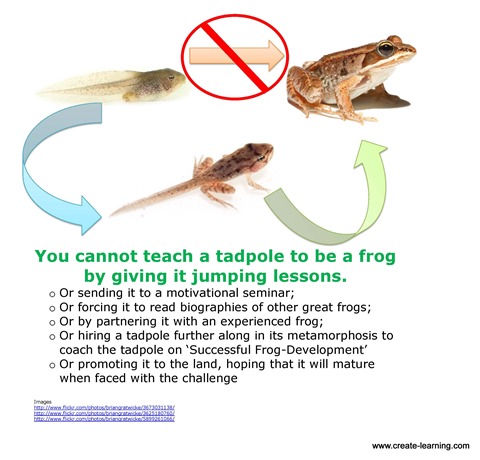
We know the Peter Principle exists, and we all laugh about it. Very few companies know how to deal with it, and they repeat the same mistakes, knowing that they are creating failure and organizational chaos.
Unfortunately, the employee who is now in a role they cannot adequately fill is usually punished by termination or sent to training.
You cannot teach a tadpole to be a frog by giving it jumping lessons.
People cannot be taught, coached, developed, and trained to work at a level of complexity above what they can do. The only way that people grow into their potential is through;
- Maturation (growing older)
- Having a manager who can understand capacity and support them to work at their full capacity. Avoiding underemployment
- Personal ability to gain wisdom through successes and failures
- Maturation of innate ability to handle complexity and make sense of longer time-spans of work
When placed in a work role that is too far outside capacity, disaster happens – personally and organizationally.
It does not have to be a management position – if you see the behaviors below, the quality of work deteriorating, the lateness of the work increasing, plus noticeable behavior changes – that person is in over their head.
What to do?
- Minimize the number of levels in the organization.
- Institute a Talent Pool Development and Succession Plan focused on maturation and development tracks based on Current-Actual-Capability and Potential-Capability.
- Have organizational knowledge of each role’s level of work and the planning + time-span and requisite skilled knowledge that is successful in that role.
- Only place people who have the complexity-processing evidenced through experience.
- Match the complexity of the role and the person.
- Hold the manager accountable for staff output and ensure they have the necessary accountability + authority to deselect staff not doing the work.
When you notice a person struggling before you try to train or fix them, Determine:
- Is this person capable of doing the work within this role as it stands right now;
- Have we, as the organization, done due diligence in determining the time-span and level of work within this role and communicated that clearly to their manager and them?
- Is their direct manager ‘Big Enough’ to frame the work’s context and add value to their work?
- What evidence do we have that clearly shows this person can do the work?
- What steps will be taken to mitigate the damage caused if the organization has failed? How can we ensure that this person is dealt with fairly? Building trust within our organization.
- If they are the wrong person for the role – what options exist?
You offer coaching and development only when you have determined they can fill the role – and they lack some skilled knowledge.
Otherwise, you are trying to teach a tadpole to be a frog by giving it jumping lessons.


